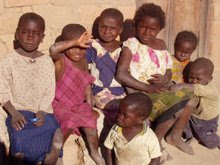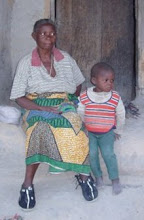It was months later when Dr.Cary e-mailed me from Zambia. His message was short. All it said was, "The women in Zambia need you". My answer was almost as short, "When do you want me to come. And where the heck is Zambia?" I trusted in his vision, and I trusted in his experience.
Dr Cary Rasoff has worked with the most effective relief agencies in the world, including Doctors without Boarders, and MERLIN (Medical Emergency Relief International Network). So when he said he was in Zambia and he thought I could be of service I didn't think twice.
When he choose Zambia, he had set out to find the people with the most need and I believe he has found them.
Zambia is a landlocked country in the Sub-Sahara area of southern Africa. It was an English colony until the 1960's so English is the native language and Zambia is not experiencing war. It is rich in mineral mining and had natural resources. So why is it the poorest country in Africa? The division of wealth is criminal, with only 14% of the population living in cities, and an unemployment rate greater than 50% , 10 million (86%) people are living below the poverty level, earning less than $1 per day.
The project that Dr Cary is heading is a model village with a school, a medical clinic, housing, farming and a community kitchen. His goal is to create a working model sustainable village that can eventually be a teaching facility for neighboring villages. With his experience and his wisdom, he has the vision and the skills to improve the lives of hundreds of thousands of widowed women and orphaned children. He has put out the call to experts with compassionate hearts who can offer green and sustainable solutions to the problems that these people are facing.
What are the problems that are causing mass genocide in Zambia today? With nearly the entire population of sexually active men and women between the ages of 15 and 30 virtually being wiped out from HIV/AIDS, there is a tremendous problem with orphaned children and widowed elderly women. It is estimated that Zambia has approximately 800,000 orphans at this time, many infected at birth. Local folk lore states that having sex with a virgin will cure AIDS, so rape of young girls is also a problem in this area. According to statistics complied by the World Health Organization, 21% of Zambia's 11 million people are infected with the HIV virus, resulting in an average expected life-span of only 33 years.
Traditional tribal life in Zambia, like most more natural societies, has always been set up for the working age generation to provide shelter and food for their aging parents, while the grandparents help out by taking care of the young grandchildren. Tragically, this is not the case now in Zambia, because an entire generation of Zambia's working age youth have been wiped out. So who is caring for these orphaned children? The problem was left in the hands of the aging grandmothers who have been doing their best to take in and care for as many children as they can. Living in mud huts, sleeping on dirt floors without blankets, they huddle together for warmth in night with temperatures that can drop to 40F (5c) these compassionate grandmothers are taking in not only their own grandchildren, but many other children who have no family left to help them. These orphans and grandmothers are without blankets and must Due to Global warming monsoons are becoming increasingly stronger, with this years flooding wiping out many of the fragile structures in which these grandmothers and children call their homes. Indigenous crops that were once a viable source of nourishment increasingly fail due to the changes in climate. Unaware of the global climate changes and the world situation, the grandmothers and children who are working in the fields continue to try to farm failing crops that once flourished.
Heavy monsoons cause flooding with annual rainfall of about 50 in (125 cm), from November to April. Without sufficient water storage there are droughts in the summers which results in only 50% of the population has access to safe drinking water. Malaria is one of the worst threads to the children and elderly who are already weak from malnutrition. It is estimated that through out the combined sub-Saharan Africa countries of Zambia, Zimbabwe, Namibia and Botswana, 500 million people are infected with Malaria and more than a million children younger than five die each year.
Thursday, March 6, 2008
Subscribe to:
Post Comments (Atom)



No comments:
Post a Comment